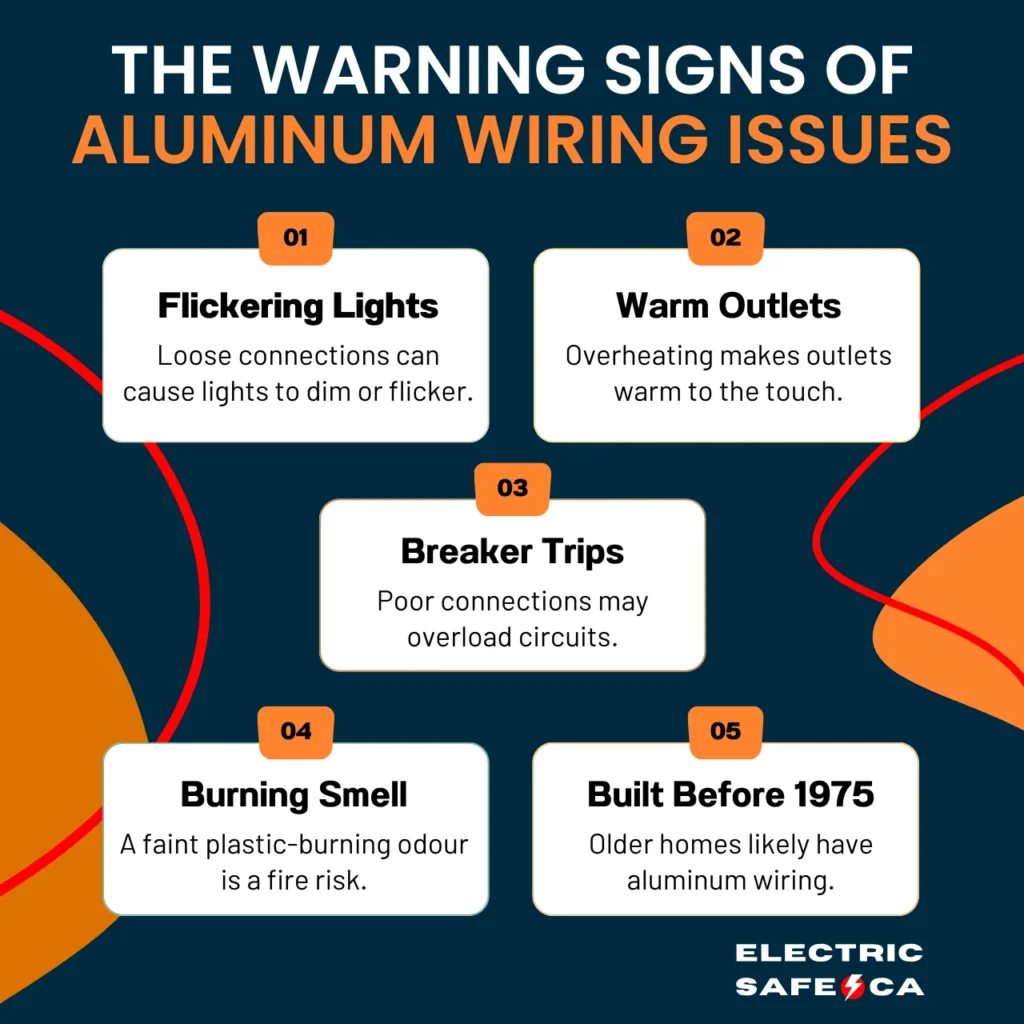If your home was built between the 1960s and 1970s, there’s a decent chance it has aluminum wiring lurking behind the walls. And if that’s the case, you might wonder: is aluminum wiring safe, or is it a fire hazard waiting to happen?

Spoiler alert. It’s complicated. Aluminum wiring isn’t an immediate death trap, but it does come with some quirks that can turn a quiet evening into an unscheduled visit from your local fire department. The good news? You’re not doomed. The even better news? There are ways to make it safer.
Quick Test: Is Your Aluminum Wiring Safe?
You’re here for a reason. Something about your wiring has you wondering. In just a few clicks, find out if your aluminum wiring is holding up, overdue for a checkup, or a disaster waiting to happen. Let’s get you some answers.
Disclaimer: This test is for informational purposes only and does not replace a professional electrical inspection. Results should not be used as a definitive assessment of your home’s safety. If you suspect any electrical issues, consult a licensed electrician. ElectricSafe assumes no liability for any actions taken based on this quiz.
Alright, you’ve got your results.
No matter where you landed, you’re in the right place.
Here’s what makes aluminum wiring risky and what you can do to keep your home from turning into a light show you didn’t sign up for.
Is Aluminum Wiring Safe? Understanding the Risks
Alright, so aluminum wiring isn’t an automatic disaster, but let’s just say it’s not winning any awards for reliability. The problem isn’t the aluminum itself; it’s how it behaves over time. Unlike copper, which stays put like a well-trained dog, aluminum has a habit of expanding, contracting, and generally being high-maintenance.
This means connections can loosen, wires can overheat, and—if left unchecked—you could be unknowingly hosting a tiny, unwanted fireworks show behind your walls. And when that happens, the real question isn’t just is aluminum wiring safe, but how safe is your home?
Throw in oxidation, which increases resistance (a fancy way of saying “traps heat like a bad sunburn”), and you’ve got a recipe for potential trouble. According to the U.S. Consumer Product Safety Commission (CPSC), homes with aluminum wiring are 55 times more likely to have fire hazard conditions compared to those with copper wiring.
Let’s look at the biggest risks so you know what to watch out for.
Expansion & Contraction
Aluminum wiring is a bit… restless. When electrical currents flow through it, aluminum expands. When things cool down, it contracts. Do this enough times, and connections start loosening, kind of like a repeatedly opened pickle jar lid that just won’t tighten anymore.

And loose connections? That’s where things get dicey. Gaps create resistance, resistance creates heat, and heat creates, you guessed it, fire hazards. Not ideal for something literally running through your walls.
Oxidation
Unlike copper, which oxidizes gracefully (think of that charming green patina on old statues), aluminum forms a crusty, high-resistance oxide layer. The problem? This buildup doesn’t just look bad it also prevents proper electrical flow and increases heat buildup.
Imagine running a marathon while wearing five sweaters. That’s what aluminum wiring does when oxidation starts piling up. The more resistance, the harder electricity has to work to get through, and the hotter things get. It doesn’t take an electrician to know that wires shouldn’t be working up a sweat.
Connection Failures
If aluminum wiring had a resume, one of its biggest red flags would be “poor team player.” It doesn’t get along well with traditional electrical connectors, which were mostly designed for copper. This mismatch leads to what electricians call “creep,” a slow but steady movement of the wire that loosens connections over time.

And when electrical connections loosen, expect flickering lights, randomly warm outlets, or, in worst-case scenarios, melted insulation and electrical fires.
Common Aluminum Wiring Issues
Now that we’ve covered why aluminum wiring can be a bit of a diva let’s talk about the real-world signs that something might be wrong. Because, let’s be honest, no one casually inspects the wiring behind their walls unless they really, really love home maintenance.
The problem is that aluminum wiring doesn’t exactly wave a red flag when it starts misbehaving. Instead, it drops subtle (and not-so-subtle) hints, like a flickering light that makes you question the paranormal or an outlet that feels a little too warm for comfort.
If you’re still asking yourself, “is aluminum wiring safe in my home?”, these warning signs might give you an answer:

- Flickering or dimming lights. No, your house isn’t haunted (probably). This often means a loose connection.
- Warm or discoloured outlets and switches. If an outlet is hot to the touch or looks scorched, it’s not normal.
- A burning smell or unusual static sounds. If something smells like it’s smouldering but you can’t find the source, check your wiring immediately.
- Circuit breakers that trip frequently. If you constantly reset breakers, your wiring may be working harder than it should.
- Buzzing or crackling sounds from outlets – Electricity should be silent. If your outlets sound like they’re whispering secrets, something’s up.
Aluminum Wiring Safety Precautions
So, we’ve established that aluminum wiring isn’t inherently dangerous, but it does need a little extra TLC. Think of it like owning a vintage car: You don’t just assume it’s fine and hit the highway at full speed. You check under the hood, listen for odd sounds, and keep an eye on the dashboard lights. The same applies to your wiring.
According to the Electrical Safety Authority (ESA), aluminum wiring can be safe when properly installed, but poor terminations and loose connections pose major risks. That’s why regular inspections and professional upgrades are crucial.
Here’s how to keep aluminum wiring safe before problems start sparking up.
Get a Professional Electrical Inspection
The first rule of aluminum wiring is don’t assume it’s fine just because the lights turn on.
An electrician can check for loose connections, overheating, and potential hazards before they become real problems. If you’re wondering, “Is aluminum wiring safe when left unchecked?”
The answer is no, and regular inspections are a must. Think of it as a check-up for your home’s electrical system, except instead of getting advice on your cholesterol, you’re making sure your walls won’t randomly heat up.
What an inspection can reveal:
- Loose connections that need tightening
- Overheating spots before they become a fire risk
- Outdated components that should be upgraded
If it’s been decades since your home’s wiring was checked, or if you’re seeing flickering lights, warm outlets, or tripping breakers, you might need to ask yourself: is aluminum wiring safe in your home right now? A professional inspection can give you that answer.
Use the Right Outlets & Switches
Not all electrical devices play well with aluminum wiring. Standard outlets and switches? They were designed with copper in mind. Connecting aluminum wires to them is like forcing a square peg into a round hole. It sort of works, but not in a way that makes anyone feel safe.
If your home still has old outlets or switches, check if they’re labelled CO/ALR (Copper/Aluminum Rated). These are designed to handle aluminum wiring safely. If they don’t have that label, it’s time to upgrade.
Why it matters:
- Standard outlets can overheat when connected to aluminum wiring
- CO/ALR-rated devices reduce fire risks
- Replacing old outlets is a quick, cost-effective safety upgrade
Don’t assume your outlets are fine just because they “look okay.” Get them checked.
Watch for Warning Signs
Aluminum wiring doesn’t always announce its problems—it whispers them first. And if you know what to listen for, you can catch small issues before they become big ones.

Warning signs to watch for:
- Flickering or dimming lights (not just during a thunderstorm)
- Warm, discolored, or scorched outlets
- A burning smell or static-like buzzing from switches
- Circuit breakers tripping frequently
If you notice any of these signs, don’t ignore them. Your wiring might be trying to tell you something like, “Hey, I need some attention before I start causing real trouble.”
Final Verdict: Is Aluminum Wiring Safe or a Fire Hazard?
So, after all this talk about oxidation, loose connections, and aluminum’s commitment issues, let’s get to the point: Is aluminum wiring safe?
The answer? It can be if it’s properly maintained.
Aluminum wiring isn’t inherently dangerous, but it is high maintenance. It expands, contracts, and oxidizes in ways that copper doesn’t, making it more prone to loose connections and overheating. And in the world of electricity, loose connections and overheating are the kind of drama you don’t want.
But here’s the good news: You don’t necessarily need to rip it all out.
When Aluminum Wiring Can Be Safe
Aluminum wiring isn’t automatically a disaster, but it does require some extra care. Regular inspections, safe connections, and using aluminum-compatible materials are key to keeping your home safe.
When Aluminum Wiring Is a Problem
If your home’s wiring already shows signs of wear, overheating, or electrical gremlins, it’s time to take action. In many cases, the safest and most effective solution is a professional aluminum wiring replacement to eliminate fire hazards and bring your home up to modern electrical standards. This could mean:
- Rewiring high-risk areas (like kitchens and bathrooms).
- Replacing the entire system if the wiring is beyond repair.
- Calling an electrician ASAP if you notice anything off. Better safe than sorry.
So, should you worry?
If your aluminum wiring is in good shape and up to code, you don’t need to lose sleep over it. But if it’s outdated, improperly installed, or just plain old, ignoring it isn’t an option. A little prevention now can save you a lot of trouble later
So, is aluminum wiring safe? The answer depends. It’s not inherently dangerous, but it’s high-maintenance.
Let’s talk if you’re still unsure about your aluminum wiring. A quick inspection could be the difference between a safe home and a costly problem down the road.
Is Aluminum Wiring Safe? Frequently Asked Questions
Is it safe to connect aluminum and copper wiring together?
Not unless you do it the right way. Aluminum and copper expand at different rates, which can cause loose connections and overheating if they’re just twisted together. If you must mix them, use AlumiConn or COPALUM connectors—otherwise, you’re basically setting up a slow-motion electrical hazard.
How long is aluminum wiring safe to use in a house?
That depends on how well it’s maintained. With regular inspections, proper connections, and the right upgrades, aluminum wiring can remain safe for decades. But neglect it, and it could turn into a fire hazard waiting for the right spark.
Is aluminum wiring safe inside an electrical panel?
If installed correctly, yes. The real risk comes from loose connections, oxidation, or improper terminations, which can lead to overheating and arcing. If your panel has aluminum wiring, make sure connections are tight, an anti-oxidant paste is applied, and the right lugs are used—otherwise, your breaker box might get a little too hot to handle.
How often should aluminum wiring be inspected in a home?
A good rule of thumb is to inspect your aluminum wiring every 5-10 years, but sooner if you notice warning signs like warm outlets, buzzing sounds, or your breakers tripping. If your wiring was last inspected when cassette tapes were cool, it’s overdue.
How do I know if my aluminum wiring is a fire hazard?
Aluminum wiring itself isn’t the villain. Bad connections are. If everything is tight, upgraded, and well-maintained, it can be safe. But if you notice flickering lights, warm outlets, a burning smell, or mystery buzzing, that’s your wiring begging for attention before it starts something you don’t want to finish.
Let’s Make Your Wiring Worry-Free
Aluminum wiring isn’t an automatic disaster, but ignoring it? Bad idea.
We’re licensed, ESA-certified electricians who know Ontario’s electrical code, like the back of our tool belts.
If you need a full rewiring, a safety upgrade, or just someone to tell you if your wiring is plotting against you, ElectricSafe has you covered.

